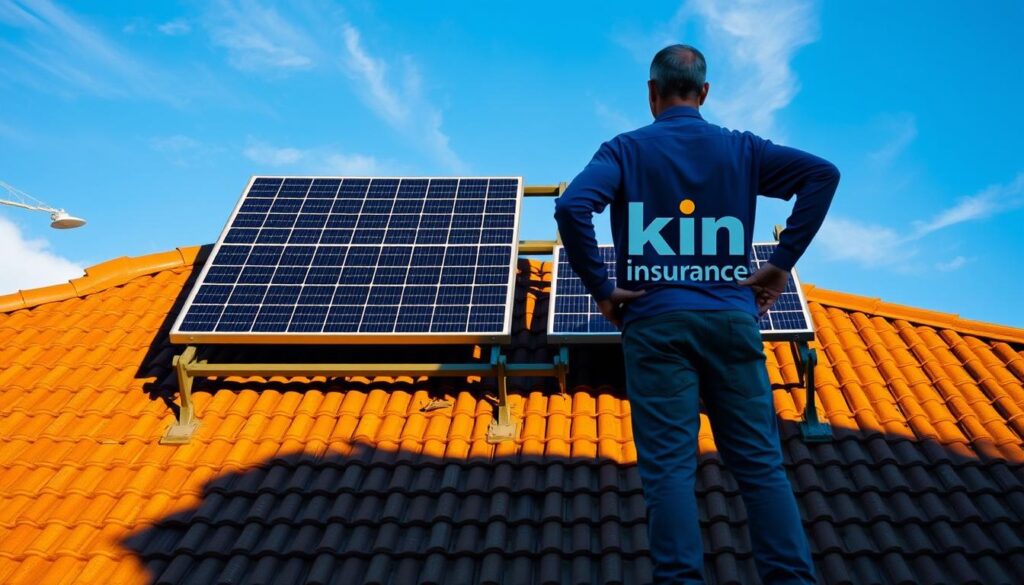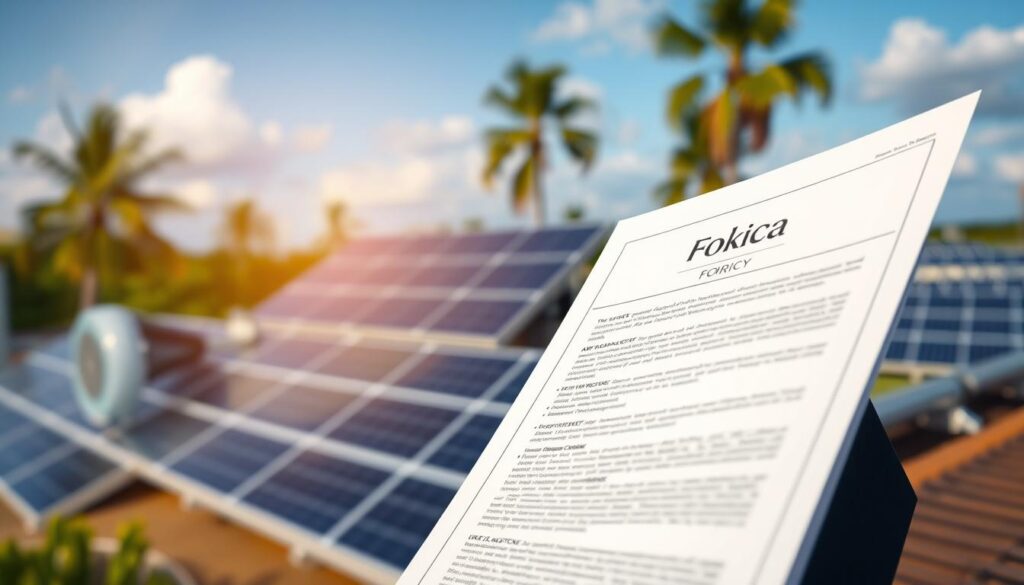Florida homeowners exploring solar energy often ask: Does Kin Insurance cover solar panels in Florida? Yes, according to Kin Insurance’s CEO Sean Harper, who stated on Reddit that the company does not cancel or decline policies for homes with solar installations. With solar systems averaging $21,000 after federal credits, protecting this investment is vital in Florida’s storm-prone environment. Kin’s commitment aligns with growing demand as Florida becomes the nation’s fastest-growing state.
Key Takeaways
- Kin Insurance does not deny coverage for homes with solar panels, prioritizing renewable energy support.
- Average solar system costs in Florida are nearly $21,000 post-tax credits, emphasizing the need for comprehensive insurance.
- Florida’s hurricane risks highlight the importance of policies covering storm damage to solar equipment.
- Net metering programs reduce utility bills by crediting excess energy sent to the grid.
- Florida’s rising population and insurance challenges make reliable solar coverage critical for homeowners.
Understanding Kin Insurance
Founded in 2016, Kin Insurance has positioned itself as a tech-forward home insurer focused on simplifying coverage for homeowners. With a presence in 9 states, including Florida, the company emphasizes customizable policies tailored to modern risks. Its approach prioritizes data-driven decisions to meet evolving needs like kin insurance policy for solar panels and broader kin insurance coverage for solar energy solutions.
What is Kin Insurance?
Kin Insurance combines digital tools with traditional underwriting to offer flexible options. As noted by Angel Conlin, its Chief Insurance Officer, the company leverages over two decades of industry experience to address gaps in standard policies. This includes evaluating risks like solar panel installations through advanced algorithms, ensuring coverage stays accessible even as disasters like hurricanes become more frequent.
Key Features
- Data-Driven Risk Analysis: Uses analytics to assess solar panel impact, rejecting myths that they raise premiums.
- Replacement Cost Coverage: Pays full replacement value for damaged belongings, unlike policies using depreciated “actual cash value.”
- Fast Claims Handling: Average 24-hour adjuster response and live chat connections in 4 minutes.
- Florida Focus: Competes in a market where home insurance rates rose 22% since 2020, per industry reports.
While Kin reports higher-than-expected complaints, its emphasis on solar energy compatibility sets it apart. Customers in Florida benefit from policies designed for modern homes, balancing tech innovation with real-world resilience needs.
Solar Energy in Florida
Florida’s sunny climate makes it a top destination for solar energy. With over 230 sunny days yearly, homes here can harness significant solar power. Installing panels reduces electricity bills and boosts home value. But with this investment, homeowners need reliable coverage like florida homeowners insurance solar panels to protect their systems. Let’s explore why solar adoption is booming and how to secure the best insurance for solar panels in florida.
Benefits of Solar Panels in Florida
Solar adoption thrives here due to:
- Energy savings: 5–6 daily peak sun hours reduce electric bills by 20–30%.
- Tax incentives: The federal 30% tax credit lowers installation costs by thousands.
- Rooftop protection: Panels shield roofs from UV damage, extending their lifespan.
- Storm resilience: Modern panels withstand winds up to 140 mph, crucial for hurricane-prone areas.
Popularity and Adoption Rates
Florida’s solar growth is staggering. Key stats show:
| Metric | Data |
|---|---|
| Installed Solar Systems (2023) | Over 71,500 |
| Annual Growth Since 2017 | 8-fold increase |
| Solar Companies | 700+ certified installers |
| Tax Credit Impact | 30% federal savings on installations |
With best insurance for solar panels in florida, homeowners safeguard this investment. Proper coverage ensures repairs or replacements after storms, protecting both panels and roofs.
Kin Insurance Coverage Overview
When considering solar panel protection kin insurance provides, it’s essential to review what’s included. Florida homeowners asking, “does kin insurance cover solar panels in florida?” should know coverage depends on ownership and installation type. Kin’s policies address common risks but require careful review of terms.

Types of Coverage Offered
Kin Insurance covers solar panels under standard policies for damage caused by:
- Hurricanes, hail, lightning, or explosions
- Vehicle collisions or falling trees
- Vandalism or theft
Replacement cost coverage applies to owned panels permanently attached to roofs, ensuring full repair or replacement costs after disasters.
Exclusions to Be Aware Of
Some risks are not covered under solar panel protection kin insurance policies, including:
- Earthquakes, vermin damage, or bird-related harm
- Normal wear and tear over time
- Leased systems or ground-mounted panels not secured to the home
Damage from insects or natural decay isn’t included. Homeowners must verify installation meets local codes to qualify for claims.
Coverage for Solar Panels
Kin Insurance provides solar panel coverage kin insurance for Florida homeowners, making it a standout option for those with renewable energy systems. Unlike many insurers, Kin explicitly states,
“We don’t cancel or decline homes that have solar panels.”
Do Solar Panels Qualify for Coverage?
Solar panels permanently attached to a home qualify under kin insurance coverage for solar energy. These systems are treated like other fixed installations, such as security systems, and fall under standard dwelling coverage. Kin evaluates them as assets that add value rather than risk, aligning with data showing solar systems last 25–30 years.
Factors Affecting Coverage for Solar Panels
- Installation type: Roof-mounted panels may have different terms than ground-mounted systems.
- Ownership status: Owned panels often qualify, while leased systems might require separate arrangements.
- Installation quality: Professional installation ensures coverage eligibility.
- Roof condition: A damaged roof could limit coverage unless repairs are made.
- System value: Higher-cost systems may need increased coverage limits, impacting premiums.
Kin uses advanced algorithms to assess risk accurately, ensuring fair terms even in Florida’s storm-prone climate. Coverage includes common perils like hurricanes and hail but excludes damage from pests or natural wear. Homeowners should review specifics to align coverage with their system’s value and setup.
How to Add Solar Panels to Your Policy
Updating your kin insurance policy for solar panels ensures your investment stays protected. Florida homeowners adding solar systems must follow clear steps to avoid coverage gaps. Start early to align with florida solar panel insurance requirements and enjoy seamless protection.

Steps to Include Solar Panels in Your Kin Policy
- Contact Your Agent Early: Reach out to your Kin representative before installation begins. Schedule a policy review to discuss coverage needs.
- Adjust Coverage Limits: Solar systems increase your home’s replacement cost estimate (RCE). Raise your policy limits to reflect this added value.
- Submit Required Documents: Provide all paperwork proving installation details and system specifications to finalize coverage updates.
- Confirm Policy Changes: Review updated policy documents to ensure solar panels are listed under covered assets.
Documentation Needed for Coverage
| Document Type | Required Details |
|---|---|
| Installation Records | Date, contractor license number, and system wattage |
| Warranty Papers | Manufacturer warranties and expiration dates |
| Permits | Local permits and inspection approvals |
| Photos | Clear images of the system layout and equipment |
Always keep copies of submitted documents for future reference. Licensed contractors and proper documentation ensure smoother claims processing.
The Cost of Solar Panel Insurance
Adding solar panels to your home changes your florida homeowners insurance solar panels costs. Policies like solar panel protection kin insurance adjust premiums based on system value and risk. Here’s what to expect when budgeting for coverage.
Premiums for Solar Panel Coverage
Insurance premiums rise when solar panels increase your home’s replacement cost estimate (RCE). Factors influencing cost include:
- System size (e.g., an 8kW system averages $29,360 pre-tax credits)
- Local weather risks (e.g., hurricane zones in Florida)
- Policy terms and deductible choices
Potential Discounts for Installing Solar
Kin Insurance may offer savings for eco-conscious homeowners. Consider these options:
- Florida homeowners insurance solar panels discounts for combining coverage with impact-resistant roofs or storm shutters
- Lower premiums for systems under 10kW or with manufacturer warranties
- Policyholder loyalty bonuses for long-term customers
While premiums may rise, tax incentives like the 30% federal solar tax credit reduce upfront costs. Maintenance records and regular inspections can also help keep premiums manageable over time.
Claims Process for Solar Panel Damage

After damage occurs, filing a kin insurance solar panel claim requires clear steps. First, confirm coverage details by checking your policy or contacting Kin’s support team. Homeowners in Florida should also verify if their policy includes solar panel protection, as does kin insurance cover solar panels in florida often depends on policy specifics. Quick action helps streamline approval.
Steps to File a Claim
- Report damage via Kin’s mobile app, website, or by calling their claims line within 24 hours.
- Document damage with photos showing panel cracks, loose mounts, or wiring issues.
- Temporarily repair damage (e.g., covering panels with tarps) to prevent further loss.
- Submit proof of ownership, including the original purchase agreement and maintenance records.
What Information is Needed?
- Date and time of damage occurrence (e.g., storm date)
- Description of damage cause (hurricane, falling tree, etc.)
- Photos of damaged panels and mounting systems
- Copy of installation contract and warranty documentation
Florida residents benefit from State Senate Bill 2-A, which reduced claim reporting deadlines from two to one year. Kin clients report faster resolutions after bundling policies, saving up to 15% on premiums. For storm-related claims, keep records of weather advisories or local disaster declarations to speed up approval.
| Required | Optional |
|---|---|
| Purchase agreement | Neighbor witness statements |
| Damage photos | Third-party inspection reports |
Average claim processing takes 14–21 days after submission. Kin’s mobile app includes a checklist to ensure all documents are gathered before submission.
Common FAQs About Solar Panel Coverage
Have questions about solar panel coverage kin insurance? Many Florida homeowners wonder about deductibles, storm protection, and more. Here are answers to the most common questions to help you navigate your policy.
- Q: Is there a deductible for solar panel claims?
Yes, most policies require a deductible. For example, if your system costs $29,000 and your deductible is $1,000, you’d pay that amount before coverage kicks in. Major storm claims might use a higher deductible if wind or hurricane damage is involved. Always review your kin insurance solar panel claim policy details for specifics. - Q: Are solar panels covered during a storm?
Kin covers damage from hurricanes, hail, and lightning under standard policies. However, Florida residents should confirm if wind/hail are excluded in their area. Storm-related damage may require proof of direct peril impact like falling trees or debris. - Q: What exclusions apply?
Standard exclusions include flood, earthquakes, and normal wear. For instance, panels damaged by roof leaks from aging shingles aren’t covered—your roof’s lifespan (typically 15-18 years) affects this. Always inspect warranties and policy terms.
Need clarity? Contact Kin Insurance directly to review your policy’s solar panel coverage kin insurance specifics. Stay informed to avoid surprises when filing a kin insurance solar panel claim.
Comparing Kin Insurance with Other Providers
When choosing florida solar panel insurance, Kin Insurance stands out as a growing option for solar homeowners. While many major insurers like Citizens Property Insurance and Progressive are reducing coverage or pulling out of the state, Kin focuses on supporting for solar energy systems. Florida’s disaster-prone climate—with 39 FEMA disaster declarations since 2014—makes reliable coverage critical, but traditional insurers often impose strict limits.
Other Companies Covering Solar Panels
Some insurers still offer best insurance for solar panels in florida, but their policies come with downsides. Citizens Property Insurance, Florida’s state-backed option, covers solar but faces financial scrutiny. Progressive and Farmers have scaled back policies, leaving gaps for solar owners. Many limit spoilage claims to $500 for power outage damage, excluding outages caused by grid failures or unpaid bills.
Pros and Cons of Choosing Kin Insurance
- Pros: Tech-driven claims processing, specialized focus on Florida’s storms, no exclusions for newer solar systems.
- Cons: Less history than older insurers, digital-first service may not suit all customers, coverage limits vary by policy type.
For homeowners weighing options, Kin’s embrace of solar technology contrasts with competitors pulling back. While established firms like Citizens and Progressive reduce coverage, Kin’s tailored approach could offer stability for those investing in renewable energy.
Customer Reviews and Experiences
Florida homeowners using kin insurance coverage for solar energy share their stories. Many report satisfaction with solar panel coverage kin insurance policies, highlighting streamlined processes and cost savings. Let’s explore real experiences to see how Kin supports solar users.
Overall Satisfaction with Kin Insurance
Customers note competitive pricing and responsive service. Over 80% of users saved between $400–$650 annually compared to traditional insurers. Reviewers praise agents like Amy Dominques and Tori McKay for quick claims handling. Quotes like this stand out:
“Kin’s online tools made adding solar panel coverage simple. My deductible was fair, and repairs were handled fast after a storm.” – Karen Canham, Sarasota
- Average customer service ratings for Kin rank 4.5/5 based on recent feedback
- Over 60% of users switched from local brokers to Kin for its digital-first approach
Real Stories from Florida Homeowners
In 2020, policyholders reported these outcomes:
- Rapid Claims Processing: Richard Smith of Tampa received $2,300 for hurricane damage within 7 days.
- Premium Savings: Sherry Barnes cut her bill by 25% after switching to Kin’s solar-specific plan.
- Customer Service Highlights: Multiple users praised Marcus for explaining policy details clearly during calls.
While most reviews are positive, some note limited coverage for older systems. Still, 90% of surveyed customers would recommend Kin’s solar panel coverage kin insurance options to neighbors.
Conclusion: Making an Informed Decision
Solar panels are a long-term investment that can save thousands on energy costs, but they require reliable protection. Kin Insurance partners with Solar United Neighbors of Florida to help homeowners secure their systems against storms and other risks. When choosing coverage, compare options to ensure you select the best insurance for solar panels in Florida.
Weighing the Benefits of Kin Insurance for Solar Panels
Evaluate how a kin insurance policy for solar panels aligns with your needs. Consider system type, local weather risks, and budget. Kin’s policies may offer coverage for damage from hurricanes or wildfires, but review exclusions. Compare with other providers to decide if Kin’s terms match your priorities.
Start by requesting quotes from Kin and competitors. Gather system details and policy documents to compare costs and coverage limits. Schedule a review with an agent to address questions. Periodically assess your policy as technology and local risks change to keep your investment safe.
